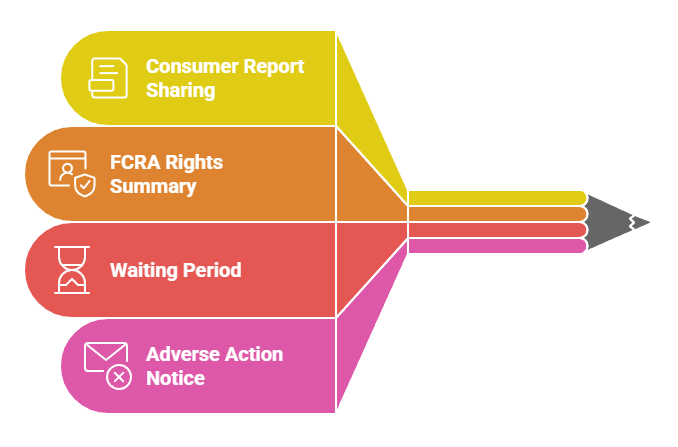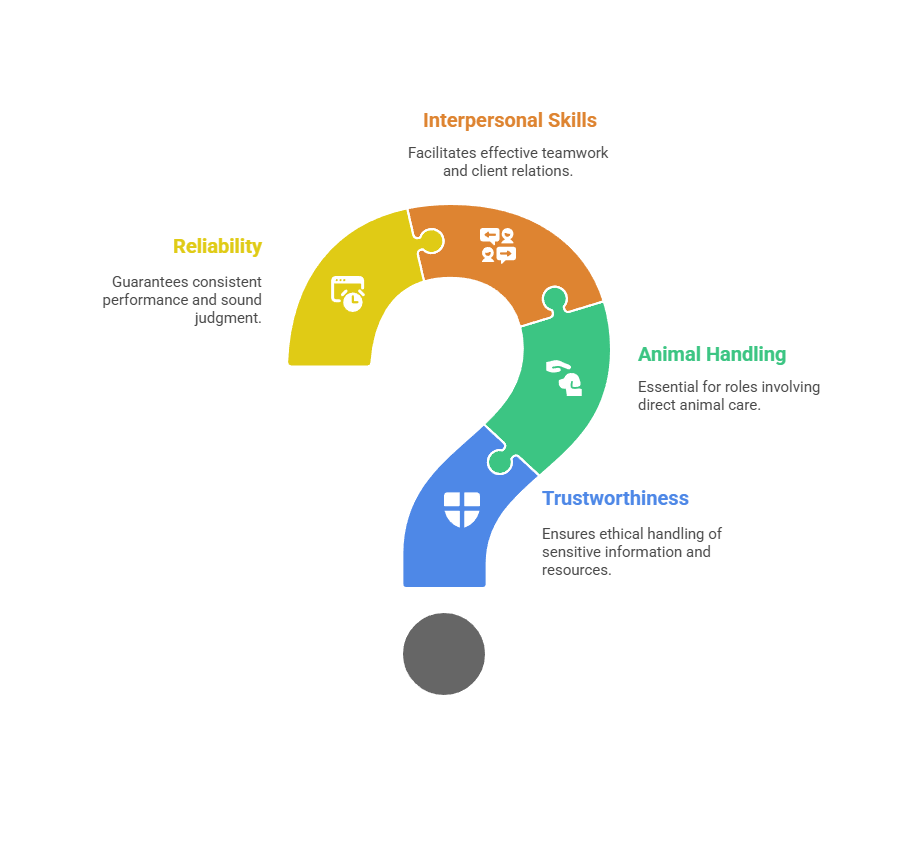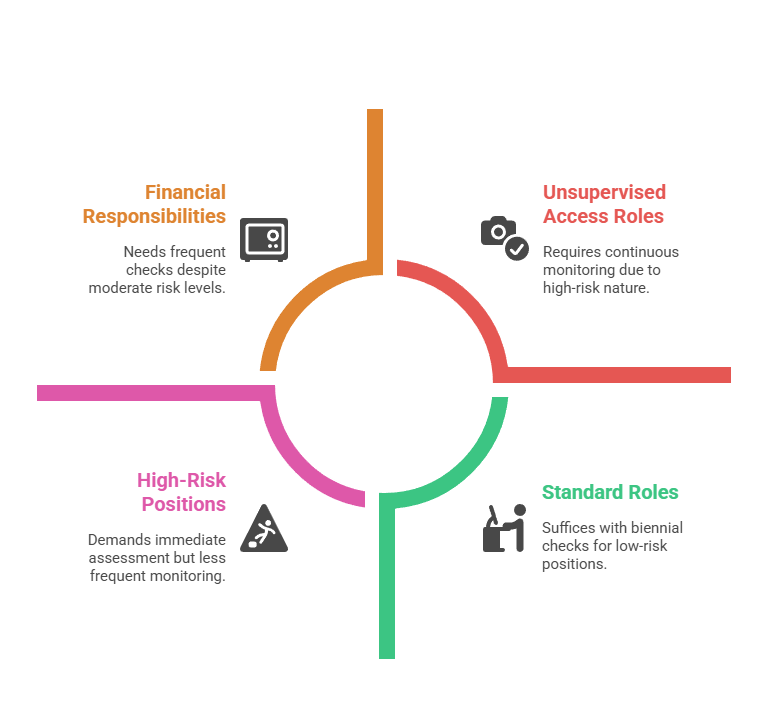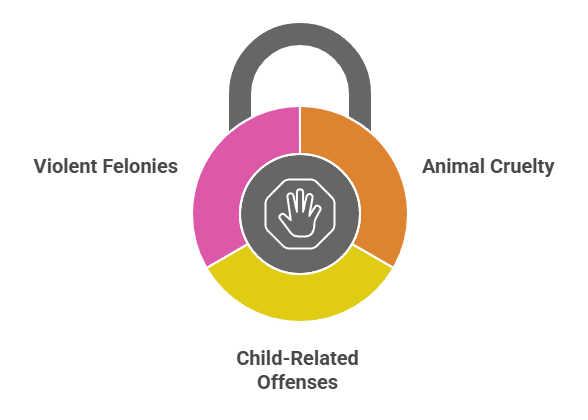Animal shelter background checks serve a critical dual purpose: protecting vulnerable animals from abuse while safeguarding the public—especially children—who interact with staff and volunteers during educational programs and adoption events. Comprehensive screening protocols for animal care workers must address unique risk factors including animal cruelty history, theft concerns related to donation handling, and child safety considerations, all while navigating the legal complexities of screening unpaid volunteers under FCRA regulations and state-specific nonprofit background check policies.
Key Takeaways
- Animal shelter background checks should screen for animal abuse, violence, theft, and sex offenses due to the unique vulnerabilities of both animals and community members in shelter environments.
- Organizations must comply with FCRA requirements even when screening volunteers, including providing pre-adverse action notices and obtaining proper consent before conducting checks.
- Humane society employee screening typically includes criminal history, sex offender registry checks, and increasingly, animal abuse registry searches in states where these databases exist.
- Background check policies should differentiate between volunteer roles with varying access levels—from administrative helpers to animal handlers and those working with children during educational programming.
- Most animal shelters require background checks for volunteers who handle animals directly, manage donations, or interact with minors, with approximately 78% conducting criminal checks on all volunteer positions.
- Animal rescue volunteer requirements often extend beyond criminal history to include reference checks, veterinary practice verification for medical staff, and motor vehicle records for transport volunteers.
- Continuous monitoring programs help shelters identify concerning incidents that occur after initial hire or volunteer approval, maintaining ongoing safety standards.
- Transparent communication about background check criteria during recruitment helps balance thorough screening with volunteer retention, reducing time waste for applicants with disqualifying histories.
Why Animal Shelters Need Specialized Background Screening
Animal welfare organizations face unique security challenges that distinguish them from typical nonprofit environments. Shelters house vulnerable animals who cannot report mistreatment, handle substantial cash donations, maintain controlled substance inventories, and frequently host children for educational tours. The dual responsibility creates complex risk management requirements that standard volunteer screening may not address.
Staff and volunteers gain access to animals with unknown trauma histories and valuable purebred animals that could be targets for theft. These facilities also maintain pharmaceutical supplies with street value. Simultaneously, these organizations serve as community hubs where school groups visit, families interact during adoption counseling, and vulnerable populations seek companionship through pet therapy programs.
Protecting Vulnerable Animal Populations
Animal cruelty perpetrators often begin with animals before escalating to human victims, making thorough screening essential for prevention. Research from the FBI's National Incident-Based Reporting System shows that individuals convicted of animal abuse are five times more likely to commit violent crimes against people. Shelter environments provide access to animals in cages who cannot escape or defend themselves.
Background checks for animal shelter workers must specifically search for convictions related to animal cruelty, neglect, fighting operations, and hoarding. Twenty-one states now maintain animal abuse registries as of 2024, though these databases are not yet interconnected nationally. Tennessee's registry requires convicted animal abusers to register similarly to sex offenders, and shelters can access this information during screening processes.
Public Safety and Child Protection Considerations
The community-facing nature of modern animal shelters requires rigorous screening comparable to youth-serving organizations. Educational programs bring school groups into facilities weekly. Families with young children visit adoption areas daily. Youth volunteer programs place teenagers in direct contact with staff members.
According to the National Council of Nonprofits, approximately 62% of animal welfare organizations now operate formal youth education programs. This triggers enhanced screening obligations. State laws in California, New York, and Illinois now specifically mandate sex offender screening for any nonprofit position involving "regular contact with minors," which courts have interpreted to include facilities children routinely visit.
Legal Framework for Nonprofit Background Check Policies
Organizations must navigate federal FCRA regulations, state-specific volunteer screening laws, and civil rights protections while establishing comprehensive safety protocols. The legal landscape becomes particularly complex when screening unpaid volunteers. Many assume background check regulations only apply to employment relationships, but this is incorrect.
FCRA Compliance for Volunteer Screening
The Fair Credit Reporting Act applies to volunteer background checks when organizations use third-party screening companies. Under FCRA Section 604, organizations must provide standalone disclosure documents informing volunteers that background checks will be conducted. They must obtain written consent before initiating checks. They must follow strict adverse action procedures if denying positions based on findings.
The pre-adverse action requirement proves especially critical. Before rejecting an applicant based on background check results, shelters must provide specific documentation:

- Copy of the consumer report: The actual background check results must be shared with the applicant.
- Summary of FCRA rights: Organizations must include the standardized FTC document explaining applicant protections.
- Reasonable waiting period: Applicants need 5-7 business days to dispute inaccuracies before final decisions.
- Final adverse action notice: After the waiting period, organizations must explain the rejection in writing.
Failure to follow these procedures has resulted in FCRA violation lawsuits with settlements ranging from $2,500 to $10,000 per affected volunteer applicant. Ban-the-box legislation in 15 states further complicates volunteer screening by restricting when organizations can inquire about criminal history.
State-Specific Requirements for Animal Care Facilities
Individual states impose varying mandatory screening requirements for animal care facilities, creating a patchwork of compliance obligations. New Jersey requires all animal shelter employees and volunteers who handle animals to undergo State Police criminal background checks. Colorado mandates checks only for paid staff in supervisory positions.
Several states have enacted legislation specifically addressing animal welfare organization screening following abuse incidents. After a 2019 case where a volunteer with prior animal cruelty convictions abused shelter dogs in Michigan, the state legislature passed requirements for criminal background checks on all individuals with unsupervised animal access. Florida's statute 828.27 requires animal control facilities to conduct criminal screening and specifically prohibits employing individuals convicted of animal cruelty or abuse within the previous ten years.
Essential Components of an Animal Shelter Background Check
Comprehensive screening programs balance thoroughness with practicality, tailoring check depth to position responsibilities and risk levels. Most animal welfare organizations implement tiered screening protocols. More extensive checks apply to positions involving vulnerable interactions.
Criminal History Searches
County, state, and national criminal database searches form the foundation of animal care worker background checks. Multi-jurisdictional searches prove essential since county-level checks only reveal convictions in specific jurisdictions. The FBI's National Crime Information Center database provides the most comprehensive criminal data, though access requires fingerprinting.
Organizations should search specifically for conviction categories relevant to shelter environments:
| Offense Category | Relevance to Shelter Operations | Lookback Period |
| Animal cruelty/abuse/neglect | Direct threat to shelter animals | Lifetime/Permanent bar |
| Violent crimes (assault, domestic violence) | Risk to animals, staff, and visitors | 7-10 years |
| Theft and fraud | Donation handling, valuable animals | 7-10 years |
| Drug offenses | Access to controlled medications | 5-7 years |
| Sex crimes | Child safety in educational programs | Lifetime for child-related |
Misdemeanor convictions deserve careful evaluation despite being less severe than felonies. Many animal cruelty charges are prosecuted as misdemeanors, and these convictions directly indicate risk to shelter animals. The lookback period typically extends seven years for most convictions under FCRA guidelines.
Specialized Registry Checks
Beyond traditional criminal databases, animal welfare organizations should search specialized registries that reveal relevant risk factors. The National Sex Offender Public Website aggregates data from all state registries. It provides free nationwide searches. Organizations should conduct these checks on all applicants who will interact with youth volunteers or educational program participants.
Animal abuse registries provide critical information where available. As of 2024, Tennessee, New York, Connecticut, Illinois, and Pennsylvania maintain searchable registries of convicted animal abusers. Responsible shelters in these states should incorporate registry checks into standard protocols. Organizations in other states should monitor legislative developments as registry systems expand nationally.
Professional license verification proves essential for veterinary staff, vet techs, and shelter medicine specialists. State veterinary medical boards maintain databases of licensed professionals, including disciplinary actions and restrictions. Even when candidates provide license numbers, independent verification through state boards confirms current status.
Employment and Reference Verification
Reference checks provide qualitative insights that criminal searches cannot capture. Speaking directly with previous supervisors at veterinary clinics, other animal welfare organizations, or related workplaces reveals patterns of behavior. Organizations should conduct at least two reference checks for paid positions and one for volunteer roles.
Reference interviews should focus on key areas using structured questions:

- Trustworthiness and integrity: "Did this person handle sensitive information or resources appropriately?"
- Animal handling competency: "How would you describe their interactions with animals under their care?"
- Interpersonal skills: "How did they work with colleagues, clients, and in team environments?"
- Reliability and judgment: "Can you describe their attendance record and decision-making abilities?"
Employment history verification confirms candidate representations and identifies concerning patterns like frequent terminations or unexplained gaps. Motor vehicle record checks apply specifically to volunteers and staff who transport animals to veterinary appointments, off-site adoption events, or foster homes.
Developing Risk-Based Screening Protocols
Not all shelter positions carry identical risk profiles, making tiered screening approaches both practical and cost-effective. Organizations can implement differentiated protocols based on access levels. Supervision availability and vulnerability exposure influence screening depth while maintaining comprehensive safety standards.
Position-Based Screening Tiers
Different shelter roles require varying levels of screening intensity based on responsibilities and access:
| Position Type | Screening Components | Processing Time | Cost Range |
| Administrative volunteers (supervised, no animal contact) | County criminal check, sex offender registry, reference check | 3-5 business days | $20-30 |
| Animal handlers (direct contact, sometimes unsupervised) | Multi-state criminal, abuse registries, thorough references | 5-10 business days | $45-75 |
| Youth program staff (child interaction, education roles) | FBI fingerprint, nationwide sex offender, child abuse registry | 10-15 business days | $65-95 |
Administrative volunteers working in offices with minimal animal contact and constant supervision represent lower-risk positions requiring basic screening. Animal handling positions require enhanced screening including multi-state criminal searches and animal abuse registry checks. Positions involving children demand the most comprehensive screening including FBI fingerprint checks and nationwide sex offender registry searches.
Volunteer-Specific Considerations
The volunteer relationship creates unique legal considerations that impact screening design. Unlike employees, volunteers cannot be required to undergo fingerprinting in many states without specific statutory authority. California permits fingerprint requirements only for volunteers in positions legally defined as having "supervisory or disciplinary authority over children."
Volunteers also expect streamlined onboarding processes, making extensive screening a potential recruitment barrier. Research from VolunteerMatch indicates that 43% of prospective volunteers who face background check delays exceeding two weeks never complete the onboarding process. Organizations should communicate expected timelines during recruitment and consider conditional start dates allowing non-sensitive activities while checks process.
Ongoing Monitoring Programs
Initial background checks provide only point-in-time snapshots. Continuous monitoring identifies arrests and convictions occurring after hire or volunteer approval. Monthly or quarterly database monitoring alerts organizations when staff or volunteers appear in criminal records, enabling prompt risk assessment.
Organizations should establish clear policies covering these key areas:

- Monitoring frequency: Annual re-screening for high-risk positions, biennial checks for standard roles, continuous monitoring for those with unsupervised access.
- Covered populations: All volunteers and staff with facility key access, anyone working with children, and positions involving financial responsibilities.
- Response protocols: Immediate assessment when alerts trigger, temporary restrictions based on charge relevance, final decisions after case resolution.
- Legal compliance: Notice and consent requirements beyond initial authorization, particularly in states regulating ongoing employee surveillance.
Some states regulate continuous monitoring of employees, requiring notice and consent beyond initial background check authorization. Organizations should consult counsel before implementing monitoring programs to ensure compliance with evolving privacy laws.
Evaluating Background Check Results and Making Decisions
Discovering criminal history doesn't automatically disqualify candidates. Organizations must evaluate findings considering offense nature, recency, rehabilitation evidence, and position requirements. Documented decision-making processes provide legal protection while ensuring fairness.
Creating Individualized Assessment Protocols
EEOC guidance on employment screening offers best practices for evaluating criminal history fairly. The three-factor individualized assessment considers the nature and gravity of the offense, time elapsed since conviction or sentence completion, and the nature of the position sought. This framework prevents blanket exclusions while still protecting vulnerable populations.
Position relevance proves particularly important. An assault conviction directly relates to animal handling roles where frustrated individuals might lash out at animals or coworkers. Minor property crimes might seem less serious than violent offenses generally, but theft convictions remain highly relevant for donation processors regardless of how long ago they occurred. Organizations should document how they apply these factors to specific cases.
Disqualifying Offenses and Zero-Tolerance Categories
Despite individualized assessment principles, certain conviction categories warrant automatic disqualification for animal welfare positions. Industry best practices establish clear boundaries:

- Permanent bars: Animal cruelty, abuse, or torture convictions result in lifetime exclusion from animal handling roles.
- Child-related offenses: Sex offenses involving children permanently bar positions where minors might be present.
- Violent felonies: Serious violent crimes indicate danger to people or animals and typically result in permanent exclusion.
Time-based restrictions apply to other serious offenses. Many organizations impose 7-10 year lookback periods for theft and fraud convictions before considering applicants for donation handling roles. They establish 5-7 year restrictions for drug convictions before allowing controlled substance access. They require 5-year periods for assault and domestic violence convictions before approving animal handling positions.
Pending charges create particular challenges since individuals are presumed innocent until convicted. Organizations should consider the nature of charges and whether the person poses immediate risk in the specific volunteer role. Policies should specify that conditional acceptance remains subject to charge outcomes.
Documentation and Adverse Action Procedures
FCRA adverse action requirements mandate specific procedures before denying positions based on background check results. Organizations must provide pre-adverse action notices including copies of the consumer report. They must include summaries of FCRA rights. They must allow reasonable time for dispute or explanation.
During the waiting period, applicants may provide context explaining report findings—identity theft, expunged records that still appear in databases, or factual errors. Organizations should have procedures for receiving this information and conducting additional investigation when appropriate. If the decision remains unchanged after reviewing applicant responses, final adverse action notices must be sent.
Documentation protects organizations legally and ensures consistency. Background check files should include screening authorizations with applicant signatures, copies of reports received, notes on individualized assessment, adverse action notices sent, and final decision rationale. These files must be maintained separately from regular personnel records and retained for at least five years.
Implementing Effective Policies and Communication

Well-designed screening programs balance comprehensive safety measures with practical volunteer recruitment needs. Clear communication, reasonable timelines, and respectful processes encourage applicant cooperation. These practices maintain security standards while supporting recruitment goals.
Transparent Application and Onboarding Processes
Honesty from the outset prevents wasted time for applicants with disqualifying histories and demonstrates organizational integrity. Volunteer applications should clearly state that background checks are required. They should specify the types of checks conducted. They should list categories of offenses that may preclude placement.
Pre-screening questions on applications remain permissible for volunteer positions in most jurisdictions. Organizations may ask targeted questions that identify disqualifying factors early:
- "Have you ever been convicted of animal cruelty or abuse?"
- "Are you listed on any sex offender registry?"
- "Have you been convicted of theft or fraud within the past seven years?"
Processing timelines should be communicated clearly and met consistently. If standard background checks require 5-7 business days, communicate that timeframe and contact applicants promptly when results arrive. Consider allowing conditional starts in low-risk capacities while checks process.
Training Staff and Volunteer Coordinators
Volunteer coordinators and HR staff implementing screening policies need training on FCRA compliance, fair evaluation practices, and confidentiality requirements. Many privacy breaches occur when well-meaning staff discuss applicant criminal history inappropriately. Staff leave background check reports accessible to unauthorized personnel in some cases.
Training should cover proper handling of sensitive information, adverse action procedures, and who within the organization can access results. Staff should understand that criminal history information is confidential and protected by law. Background check reports may not be shared with board members, other volunteers, or staff without legitimate need to know.
Cost Management and Vendor Selection
Background check costs represent significant nonprofit expenses, particularly for organizations recruiting large volunteer cohorts. Volume pricing negotiations with screening vendors can reduce per-check costs from $45-75 to $25-40 when committing to minimum monthly volumes. Organizations should compare at least three vendors, evaluating not just price but also turnaround time, database comprehensiveness, and customer service quality.
Some vendors offer nonprofit discounts or pro-bono screening for charitable organizations. Organizations should inquire about charitable pricing when soliciting vendor proposals. They should be prepared to provide 501(c)(3) documentation to qualify for discounted rates.
Balancing Safety, Privacy, and Second-Chance Opportunities
Comprehensive screening must be balanced against fairness principles, recognizing that 70-100 million Americans have criminal records. Blanket exclusions eliminate enormous volunteer pools. Progressive organizations implement nuanced policies that protect vulnerable populations while offering redemption opportunities.
Fair-chance policies acknowledge that people with criminal histories can contribute meaningfully when offenses are unrelated to position responsibilities. Organizations might accept volunteers with property crime convictions from 10+ years ago for animal socialization roles that don't involve donation handling. They might consider candidates with substance abuse histories who have completed treatment and maintained sobriety for specified periods.
Transparent communication about evaluation criteria helps applicants understand their prospects honestly. Policies might state: "We consider individuals with criminal histories on a case-by-case basis. However, convictions for animal cruelty, violent crimes, sex offenses, or theft within the past seven years typically preclude placement in positions involving animal care, child interaction, or financial responsibilities." This clarity respects applicants' time while maintaining safety standards.
Conclusion
Comprehensive animal shelter background checks protect vulnerable animals and community members while supporting organizational missions through thoughtful volunteer and staff selection. By implementing risk-based screening tiers, maintaining FCRA compliance, and establishing fair evaluation criteria, animal welfare organizations balance safety with practical recruitment needs. As animal abuse registries expand and screening technologies evolve, organizations should review policies annually to incorporate legal developments and industry best practices. Thorough background screening represents not a barrier to volunteer engagement but a foundation for building trustworthy teams dedicated to animal welfare and community service.
Frequently Asked Questions
Do animal shelters require background checks for all volunteers?
Most animal shelters conduct criminal background checks on volunteers who handle animals directly, interact with children during educational programs, or manage donations and financial responsibilities. Some organizations use tiered approaches where administrative volunteers in supervised office environments receive basic screening while animal handlers undergo comprehensive checks. Approximately 78% of animal welfare organizations report conducting some form of background screening on all volunteer positions, though depth varies by role.
What disqualifies someone from volunteering at an animal shelter?
Animal cruelty or abuse convictions typically result in permanent disqualification from animal shelter volunteering, as do sex offenses involving children for positions where minors might be present. Most organizations also exclude individuals with recent violent crime convictions from animal handling roles and those with theft or fraud convictions from donation management positions. Organizations conduct individualized assessments considering offense nature, recency, rehabilitation evidence, and position requirements rather than applying blanket lifetime bans.
How long does an animal shelter background check take?
Standard animal care worker background checks typically take 3-7 business days when using commercial screening vendors for county and state criminal database searches plus sex offender registry checks. More comprehensive screening including FBI fingerprint checks can require 10-15 business days due to processing through federal databases. Timeline variations depend on the counties searched, whether fingerprinting is required, and screening vendor workload during peak hiring seasons.
Can animal shelters run background checks on volunteers without consent?
No, organizations must obtain written consent before conducting background checks on volunteers when using third-party screening companies, as required by the Fair Credit Reporting Act. The consent must appear on a standalone disclosure document separate from the volunteer application, clearly stating that a background check will be conducted. Verbal consent is insufficient; written authorization with the applicant's signature is legally required. Organizations that conduct checks without proper consent face FCRA violation penalties.
Are there animal abuser registries that shelters can check?
Yes, five states currently maintain animal abuser registries that animal shelters can search during volunteer and employee screening: Tennessee, New York (Suffolk County only), Connecticut, Illinois (Cook County), and Pennsylvania. Tennessee's registry is the most comprehensive, requiring convicted animal abusers to register similarly to sex offenders, with publicly searchable information including names, addresses, photos, and conviction details. However, these registries are not interconnected nationally, so an abuser convicted in Tennessee won't appear in New York's database if they relocate.
How much do background checks for animal shelter volunteers cost?
Basic criminal background checks suitable for lower-risk volunteer positions typically cost $20-35 per applicant and include county criminal searches and sex offender registry checks. Enhanced screening for animal handling roles with multi-state criminal databases costs $45-75 per person. Comprehensive checks including FBI fingerprint searches for positions involving children range from $65-95 per applicant. Many screening vendors offer nonprofit discounts reducing costs by 20-40%.
Do background check requirements differ for paid staff versus volunteers at animal shelters?
While both employees and volunteers should undergo background screening appropriate to their roles, legal requirements often differ between these groups. Employment screening is subject to Title VII discrimination protections and state employment laws, while volunteer screening generally is not. Some states prohibit requiring fingerprints from volunteers without specific statutory authority, though paid employees in similar roles must submit to fingerprinting. In practice, organizations often conduct more extensive checks on paid staff in supervisory positions, veterinary roles, or financial management.
What should animal shelters do if a volunteer is arrested after passing their initial background check?
Organizations should implement continuous monitoring programs that alert them when existing volunteers or staff members are arrested after their initial screening. Upon receiving an arrest alert, the organization should immediately assess whether the charges create safety concerns requiring interim restrictions. Since arrests don't prove guilt, organizations should follow due process principles, allowing the volunteer to explain circumstances while implementing necessary temporary protections. If conviction occurs, shelters should conduct the same individualized assessment used for initial applicants.
Additional Resources
- FCRA Compliance Guide for Nonprofits: Understanding Background Check Requirements for Volunteer Organizations
https://www.ecfr.gov/current/title-16/chapter-I/subchapter-F/part-600 - Animal Legal Defense Fund: State Animal Abuser Registries Overview and Access Information
https://aldf.org/topic/animal-abuser-registries/ - National Council of Nonprofits: Screening Volunteers - Legal and Practical Guidelines
https://www.councilofnonprofits.org/tools-resources/screening-volunteers - EEOC Guidance on Consideration of Arrest and Conviction Records in Employment Decisions
https://www.eeoc.gov/laws/guidance/consideration-arrest-and-conviction-records-employment-decisions-under-title-vii - Corporation for National and Community Service: Risk Management and Volunteer Screening Toolkit
https://americorps.gov/partner/resources/risk-management - National Sex Offender Public Website: Multi-State Sex Offender Registry Search Tool
https://www.nsopw.gov/
Still have questions?
Get in touch with our team today for a personalized demo and discover how our tailored volume pricing and packages can drive results for your business!
How useful was this page?*
Note: your comments are anonymous. We use them to improve the website. Do not include any personal details.
Visit our FCRA Compliance Tool or leave a message here if you need a response.
From the blog Explore the GCheck Content Hub

What Shows Up on a Home Health Aide Background Check: A Complete Compliance Guide for Employers and Job Seekers
4 Dec, 2025 • 18 min read
Hospital Volunteer Background Check: Complete Compliance Guide for Healthcare Facilities
4 Dec, 2025 • 20 min read
Florida MVR Check: Complete Guide to Driving Record Screening for Employers
4 Dec, 2025 • 16 min readThe information provided in this article is for general informational and educational purposes only and should not be construed as legal advice or a substitute for consultation with qualified legal counsel. While we strive to ensure accuracy, employment screening laws and regulations—including but not limited to the Fair Credit Reporting Act (FCRA), Equal Employment Opportunity Commission (EEOC) guidelines, state and local ban-the-box laws, industry-specific requirements, and other applicable federal, state, and local statutes—are subject to frequent changes, varying interpretations, and jurisdiction-specific applications that may affect their implementation in your organization. Employers and screening decision-makers are solely responsible for ensuring their background check policies, procedures, and practices comply with all applicable laws and regulations relevant to their specific industry, location, and circumstances. We strongly recommend consulting with qualified employment law attorneys and compliance professionals before making hiring, tenant screening, or other decisions based on background check information.

